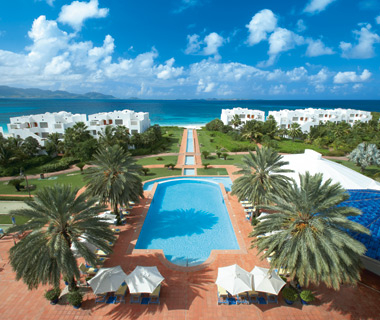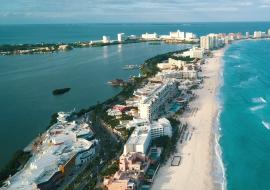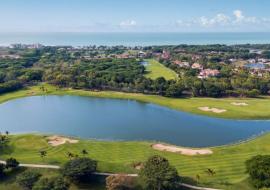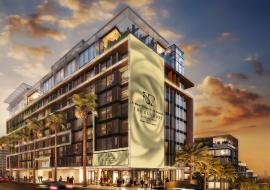The Next Wave of Caribbean Resorts

By several measures Caribbean hotel and resort development is now on an upward trajectory. The roster of newly opened regional resorts includes properties in several categories, from luxury to all-inclusive.
These new resorts include the Eden Roc at Cap Cana, a member of the Leading Hotels of the World, a five-star boutique resort featuring 34 freestanding suites and three private bungalows with private swimming pools.
Also new in the Dominican Republic is Riu Palace Bavaro, a large-scale all-inclusive resort located on Arena Gorda beach in Punta Cana. The property offers four swimming pools, a children's pool and mini-club, as well as a spa with sauna, Jacuzzi and gym. Palace Bavaro patrons have complimentary access to a nightclub, the Riu Palace Macao casino, and a sp and fitness center, all located in the Riu complex.
Several Caribbean properties also opened in late 2011. Puerto Rico welcomed the St. Regis Bahia Beach Resort, a 483-acre property located on a former coconut plantation between the El Yunque rainforest and the Espiritu Santo River.
The luxury resort features lakes, nature trails, a terraced oceanfront swimming pool, and kayaking on the Espiritu Santo River. In Barbados, the 118-room Courtyard by Marriott Bridgetown opened late last year in Christ Church’s Garrison Historic district.
In the U.S. Virgin Islands, St. Thomas saw the re-launch of what is easily its best-known resort, the Marriott Frenchman’s Reef Resort & Spa following a $48 million renovation. New amenities include three pools, the Lazule Sea Spa & Salon, a generous outdoor deck featuring sweeping views of the island, plus a grill and lounge and a terraced bar.
Later this year, St. Lucia’s Jalousie Plantation will complete a $100 million renovation and re-branding that will turn the property into The Tides, Sugar Beach. The conversion will include the construction of new luxury villas and a new spa, plus a complete renovation of the resort’s luxury Sugar Mill rooms.
Finally, in Jamaica, widely viewed as the region’s signature destination, Sandals Grande Riviera Beach & Villa Golf Resort debuted late last year following a $60 million renovation that added the Riviera Beach Club, a trendy resort spot with pool-side butler service, a grotto pool and fire pits. The renovation also added seven new and redesigned restaurants and in-room upgrades, including plasma TVs and iPod docking stations in suites, plus newly outfitted bathrooms.
All of these new developments come amidst improving hotel business in the Caribbean. A Smith Travel Research report found that Caribbean hotel occupancy totaled 60.7 percent in 2011, up from 60.4 percent in 2010.
Yet despite the increasingly rosy picture, hotel development in the region faces an uncertain future. Indeed, if the Caribbean’s curiously inefficient air transportation network its touristic Achilles’ heel, hotel development is the region’s tricky knee, holding up most times, but always in threat of a critical breakdown.
The market’s fragility is evident in the many Caribbean hotel developments that remain inexorably stalled. Projects that appear to be going nowhere include the Four Seasons in Barbados, the Westin Roco Ki in the Dominican Republic, and the Ritz-Carlton in the Turks and Caicos Islands, all of which were launched over the past several years but subsequently suspended construction. A seventh resort, the Viceroy Anguilla, was completed but later landed in foreclosure.
Caribbean tourism officials blame developers who ran out of funds during construction as the economic downturn took its toll in 2008 and beyond. Moreover, Caribbean developers at that time relied heavily on a resort/luxury residence model that combined high-end condominiums and villas with hotel rooms in one development. When residence sales slumped with the weakening global economy, that model proved economically unviable.
Especially damaging, according to development sources quoted in local press reports, is the practice in most Caribbean countries to spend residence buyers’ deposits on construction rather than locking the funds away in escrow. As a result, none of the buyers’ money is left at the stalled projects. The major hotel companies associated with the projects, contracted to brand and manage the properties but not to sell residences, aren’t held responsible for the funds.
Representatives for Four Seasons and Westin parent Starwood Hotels & Resorts have indicated their disappointment at the status of the projects, according to regional media reports, and a Four Seasons representative reportedly said the company has set new conditions for prospective developers to protect buyers of Four Seasons-branded residences.
The end result may just be that the business model that powered one of the Caribbean’s largest resort development waves in recent years is not longer workable. “That model is dead for the next three to five years,” said Rick Newton, founding partner of Resort Capital Partners LLC, in a report on the caribbean360.com website.
While hotel and resort development in the region is certainly not dead, apparently at least one method of creating and financing new projects is on life support. And a new model behind the next wave of Caribbean resort development has yet to fully emerge.














